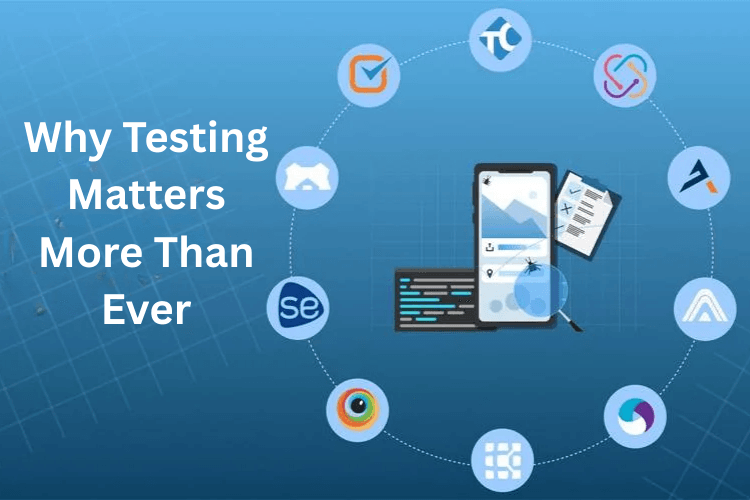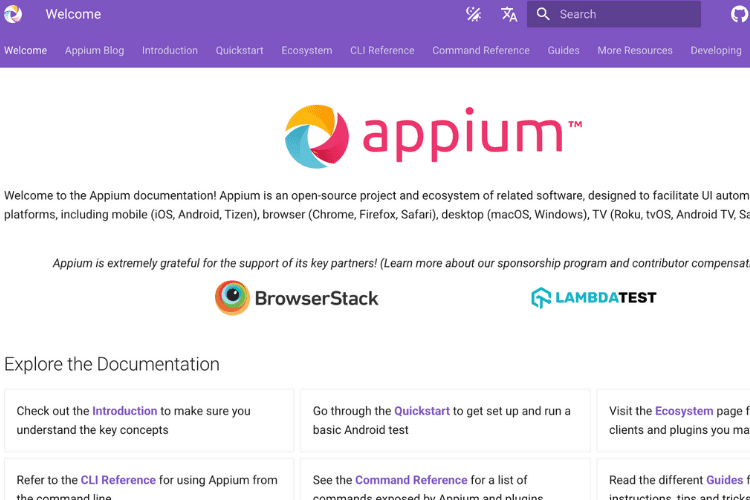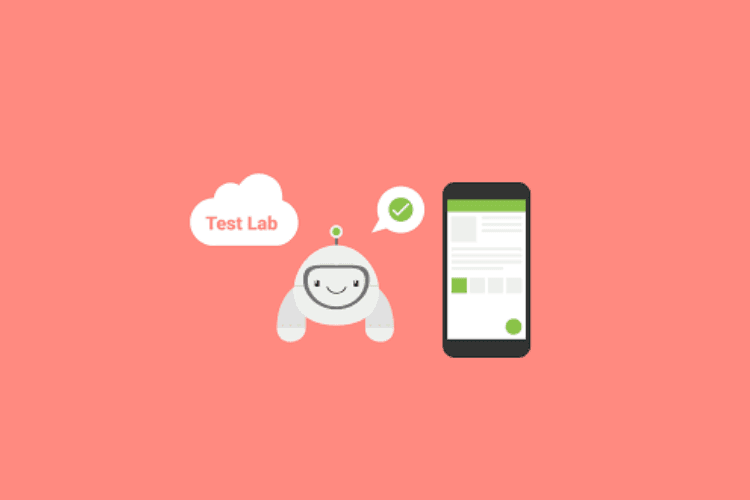Developing a Shopify mobile application is only half the battle—ensuring it works flawlessly across devices is what sets successful apps apart. Poorly tested apps risk crashes, security issues, and frustrated users, which can quickly damage revenue and reputation. To help Shopify developers avoid these pitfalls, mobile application testing services provide the right set of tools to validate performance, usability, and compatibility. In this guide, we explore the best mobile app testing tools every Shopify developer should know before launching their app.
I. Why Testing Matters More Than Ever

The mobile app landscape is expanding across all industries. Organizations are preparing to take strong, necessary measures for developers and potential users. 77% of mobile users are concerned about how their mobile application performs. Nearly 50% of consumers delete the application with any glitches. The mobile application testing services are an effective method to ensure the app matches both corporate & customer standards.
Before deploying the application, the mobile app must pass the testing scenarios. Shopify is the versatile option to run an e-commerce store & manage a lot of routine tasks through integration for payments, support, and marketing. Before you release your Shopify app, make sure it is accessible, scalable & matches all the regulatory standards.
Shopify testing is more than a routine task. It’s necessary to achieve a thriving & reliable application by using a testing tool. The tools empower us to identify & recover the bugs before they impact the users. The proactive testing approaches not only mitigate the negative reviews but also avoid financial losses.
Releasing a Shopify app without testing can cause errors during the checkout process. It could result in abandoned carts and lost sales. It will directly impact your revenue. Comprehensive Shopify app testing helps to detect and resolve issues earlier. Testing ensures your app will seamlessly integrate with other Shopify integrations. Consistent mobile app testing services ensure the app maintains compatibility & offers a smooth & effective user experience.
Here, we mentioned a few tools for mobile application testing services, with their characteristics that every developer should know.
II. Key Considerations for Testing Shopify Mobile Apps
2.1. Native vs. Embedded Apps
While testing the Shopify app, check whether it’s a native app or an embedded application. Native apps need testing for OS limitations, device hardware access, and platform-specific OS features, whereas Embedded apps focus on browser compatibility, consistent UI elements, and performance under various network conditions. The Native Shopify applications are leveraged with specific device features that embedded apps can’t access.
So, testing is performed to verify the accessibility, performance across multiple OS versions, ease of navigation, and functionality. Embedded Shopify apps reside within the admin, so testing targets on seamless integration, navigation, and a consistent User experience. Testing is performed to measure consistency, functionality, and collaboration with other tools.

2.2. Tech Stack Matters
Before testing Shopify mobile apps, determine which tools are compatible with them. Ensure the Shopify apps function correctly across the vast mobile OS & device types. It should match various screen sizes & resolutions. Testing app loading time & functionality on various devices, responsiveness should also be tested. Verify seamless integration with the 3rd party Shopify APIs. Conduct security testing to safeguard the user’s data & the scalability under load. Determine the app's intuitiveness and navigation for better satisfaction of users.
2.3. Real Device Testing vs. Emulators
Testing the Shopify mobile app needs a strategic approach to verify a robust & user-friendly experience. When choosing real-device testing, it offers accuracy and involves a higher cost for device acquisition & maintenance. It is necessary for validation of the end-to-end user experience under various loads, security, and localization. Real devices can be integrated with CI/CD pipelines for automation testing.
Emulator testing offers a controlled environment for initial-stage testing. These are cost-effective and faster, enabling wide device coverage. They are less reliable for performance-specific issues and easier to integrate with the automated testing frameworks. Real-device testing is necessary for Shopify mobile application testing services since it ensures a seamless & reliable user experience. It leads to a robust & user-friendly Shopify store.
III. The Top 6 Testing Tools for Shopify Mobile Developers
3.1. Appium – Cross-Platform Flexibility for Serious Devs
One of the best mobile app testing services tools recommended by industry experts is Appium. Appium is an independent framework for automating native, mobile web, and hybrid applications for PC, iOS, and Android platforms. Its versatility and scalability make it a popular tool for testing mobile apps. Unlike other popular test frameworks, Appium is cross-platform compatible, meaning you can run the same tests across several platforms. It also supports real-device testing and emulators.

Lastly, Appium's integrated UI automation allows it to provide comprehensive information logs and reports for useful analysis and debugging. Python, Ruby, Java, and other popular programming languages are supported by the Appium mobile testing framework. The switch to Appium is simple and seamless since testers and developers may use their current frameworks and coding expertise. This is the best tool for Shopify mobile application testing because of its flexibility, ease of integration with CI/CD, and ability to handle a dynamic user interface.
3.2. BrowserStack – Instant Access to Real Devices
With the help of the cloud-based testing platform BrowserStack, testers and programmers can test web and mobile apps both manually and automatically across a range of browsers and mobile devices. The goal of BrowserStack is to give developers and testers the greatest tools and infrastructure so they can create and test mobile apps more quickly and confidently, freeing them up to concentrate on user experience and application quality.
Developers can include real-time testing in their apps across hundreds of devices and browsers thanks to its scalable and reliable testing environment. BrowserStack easily integrates with other well-known test automation frameworks, such as Selenium, Appium, and Espresso, allowing developers to use their preferred testing tools.

With BrowserStack, developers and testers from all around the world can collaborate on the same testing projects and give immediate feedback. Shopify devs from an app testing company like to use this tool because of its ease to test the framework & mobile view contexts.
3.3. Firebase Test Lab – Scalable Android Testing
Firebase Test Lab is a cloud-based environment for the testing of Android & iOS applications on multiple devices & configurations. This tool, widely used by a mobile testing company, offers physical & virtual devices that enable you to run tests that simulate real-time environments so you can verify the application works as designed. This tool is great for the performance/stress testing service.
It is ideal if you are building Android-first Shopify apps. It helps to identify issues that might only occur on specific devices before the app is released for users. This tool enables testing on a variety of physical devices & emulators involving various screen sizes, versions, and hardware configurations. The Test Lab tool can easily integrate with multiple development platforms, including CI/CD pipelines, Firebase console, and Android Studio.
3.4. Detox – Built for React Native Apps
Detox is a mobile testing framework that is useful for testing React Native apps. The key benefits of using Detox are its ability to direct interaction that enables accurate testing. Detox interacts with the mobile app directly rather than relying on an emulator/simulator. Detox is designed for React Native app testing that supports both Android & iOS. Detox offers a range of APIs for interacting with mobile apps and the ability to simulate user inputs. These end-to-end testing frameworks are the best choice for the QA team's app testing services. Detox enables synchronous execution by running tests on the same thread as the user interface of the program.
By ensuring that the application state and the tests are constantly in sync, the synchronization produces more consistent and dependable results. Detox makes sure that the tests only run while the app is not in use by synchronizing with its lifecycle. This increases the tests' reliability and reduces the likelihood of false negatives brought on by timing errors.
3.5. Kobiton – Real Device Testing with Visual Validation
Kobiton is a powerful cloud-based platform that allows the execution of manual & automated web & mobile testing. This mobile app testing tool performs well for both manual & automated testing. Its ability to do codeless testing makes it simple & fast to run the tool. It is good to choose a tool for mobile application testing service to verify the performance and functionality of any app. Using this tool, you can run the automated tests with Appium for mobile apps & Selenium WebDriver app. Kobiton allows running the tests on a vast number of devices. It can seamlessly integrate with CI/CD platforms and Jira.
Kobiton is a tool for mobile testing that speeds up the delivery and testing of mobile applications. It allows for both automatic and manual testing on real devices or emulators, whether they are on-premises, in the public cloud, or in the private cloud. It employs no code technology and works well with native applications, iOS, and Android.
It extensively evaluates your user interface and user experience on every device that is accessible. Kobiton makes scriptless app automation possible for continuous, large-scale testing. It reduces app abandonment, boosts income on mobile channels, and enhances mobile app performance to achieve higher app store rankings.
3.6. TestProject – Free, Community-Driven, and CI-Ready
TestProject is the free, community-driven testing tool popular among the industry for its unique set of features. This open-source tool offers codeless testing for both iOS & Android apps. This test automation tool has the potential to deliver accurate results even with minimal setup. This is great for a team with less QA experience.
Shopify is the best tool to integrate with small dev teams & individuals. Web, API, and mobile app development may be automated with Test Project, an end-to-end automation solution. Standard open-source automation technologies like Selenium and Appium serve as the foundation for the Test Project. It's a free, cloud-based, community-powered test automation platform, which can be used to record, create, and analyze test automation, and this is what sets this technology apart. Furthermore, TestProject mobile app testing service offers community Addons that make it a robust and reliable tool. It eliminates the challenges of installing & managing drivers independently for every platform & browser.
IV. Bonus Picks (Honorable Mentions)
4.1. XCTest / Espresso
Espresso is the most popular mobile testing framework known for its ease of adaptation. It is used for testing both native and Android apps. Utilizing Espresso in Shopify app development, the team can design & deploy Android UI tests. Developers can craft the test scenario & test the behavior of UI elements through their functionality. It allows effortless setup & synchronized setup. This Android-specific platform involves a simple API.
Teams can make sure their app works properly in a variety of scenarios and satisfies the high user experience criteria that Apple consumers demand by utilizing XCUITest. This framework is a component of the XCTest library and is intended to communicate with the user interface of your application in order to verify how it behaves while being tested. Because it can replicate taps, swipes, and other motions, it's particularly useful for testing that replicates basic user interactions. Using XCUITest gives QA teams total control over the application being tested, allowing for the use of sophisticated methodologies.
4.2. Sauce Labs
Developers like Sauce Labs because of its extensive testing capabilities on a single platform. Both functional and non-functional tests are among its capabilities. Particularly when creating applications for various platforms, the ability to run all test types on a single platform reduces test duplication and expedites the testing process. It removes the demand for managing physical test infrastructure by enabling developers and testers to run both functional and non-functional tests from a single cloud platform.
This is an alternative to BrowserStack. Throughout the software testing lifecycle, it enables you to rapidly test distinct user interface elements separately for quicker feedback. It provides a low-code solution that generates test cases, scripts, and data on its own using natural language processing. Its revolutionary method to test automation lowers CI expenses and optimizes CI/CD pipelines.
4.4. LambdaTest
LambdaTest is a mobile application testing services platform that can be used to run manual & automated tests on real devices & browsers. It supports real browsers for testing and seamless integration with testing frameworks. This tool offers real-time testing visibility for identifying complex issues.
This tool is best for companies that have a limited budget for cross-platform & cross-browser testing. Companies that require geolocation testing for consistency can also benefit from this. It comes with integrated debugging facilities. It utilizes a single YAML for grouping & distributing the browser tests across the environments. It cuts down the test duration and offers accurate results.
V. Ready to Ship Faster? Pick the Tools That Fit Your Needs
Being an e-commerce company owner, having a Shopify site is the key to success. But is it enough to guarantee success? The answer is no! Slow-loading, unresponsive applications can lead to frustrated customers, abandoned carts, and lost revenue. A flawless app is necessary to engage more and more users in your stores.
This is when Shopify app testing comes to the fore. Without stringent testing practices, an application may have lots of malfunctions that damage the business's reputation. Shopify app testing is necessary to verify that it handles the traffic spikes & maintains high performance under peak loads.
With an abundance of tools available in the market, in the above section, we have described a few of them. Whether you are a startup business or an enterprise, these tools for app testing services help you to boost the test coverage & cut down the potential errors. Select any one of the tools that aligns with your budget, stack & workflow.
Read more:
